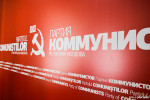
The bans are counterproductive, including for the countries that impose them, because the farmers reorient themselves and find other markets. The ‘open doors’ approach is the most realistic one for the Moldovan agriculture. This policy is good both for Moldova and for its commercial partners, Charge D 'Affaires ad interim of the U.S. Embassy Kara McDonald said in an interview for Radio Free Europe, quoted by IPN.
According to her, the U.S. invests in Moldova based on the ‘open doors’ policy, this approach being more realistic than the ‘closed doors’ approach adopted by Russia. The United States yearly invests US$3.5 million in Moldova’s agriculture. After Russia imposed a ban, the U.S. decided to invest US$1 million to counteract its effects.
“We work with the Moldovan farmers, including as regards quality, so that their products meet the international export standards. This will enable the farmers to profit from the provisions of the Deep and Comprehensive Free Trade Agreement with the EU, which was signed at the end of June. There are other markets open to Moldova, including those from the Middle East or even of the neighboring states Ukraine, Belarus, and Kazakhstan. We are making effort to establish contacts between them and potential buyers from outside the country. These days, our colleagues are accompanying 20 local producers on a trip to Romania to establish contacts and to identify new export markets. In August, we will bring a group of entrepreneurs from the Baltic States to Moldova,” said Kara McDonald.
She also said that it is very important for the Moldovan farmers to identify and diversify the export markets. “It is challenging for the Moldovan fruit and vegetables to reach the U.S. market, especially owing to the geographical distance. But our market is anyway open to products from other sectors of the Moldovan agriculture,” stated Kara McDonald.
The representative of the U.S. Embassy noted that the United States always maintained that Moldova must not choose between the West and the East, including when establishing commercial relations.











